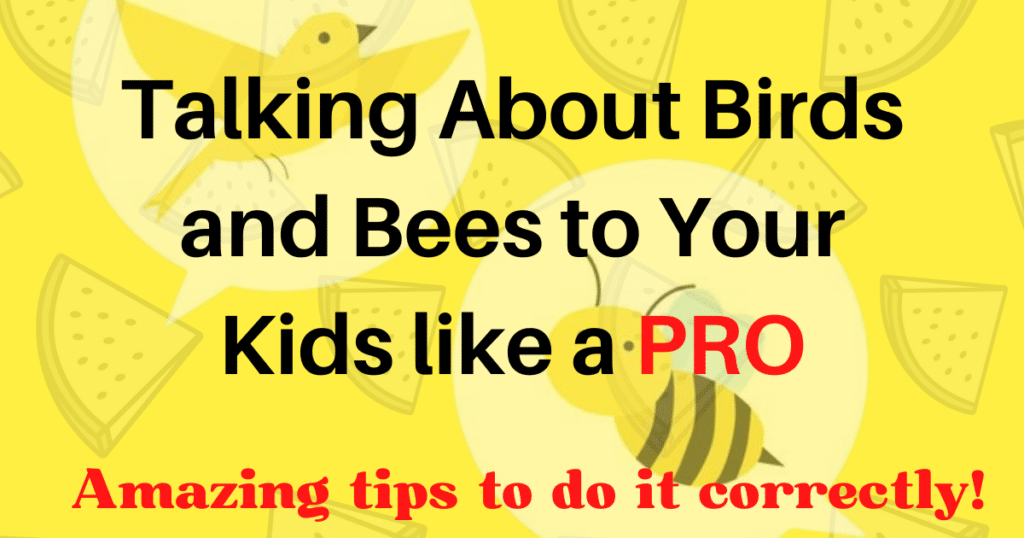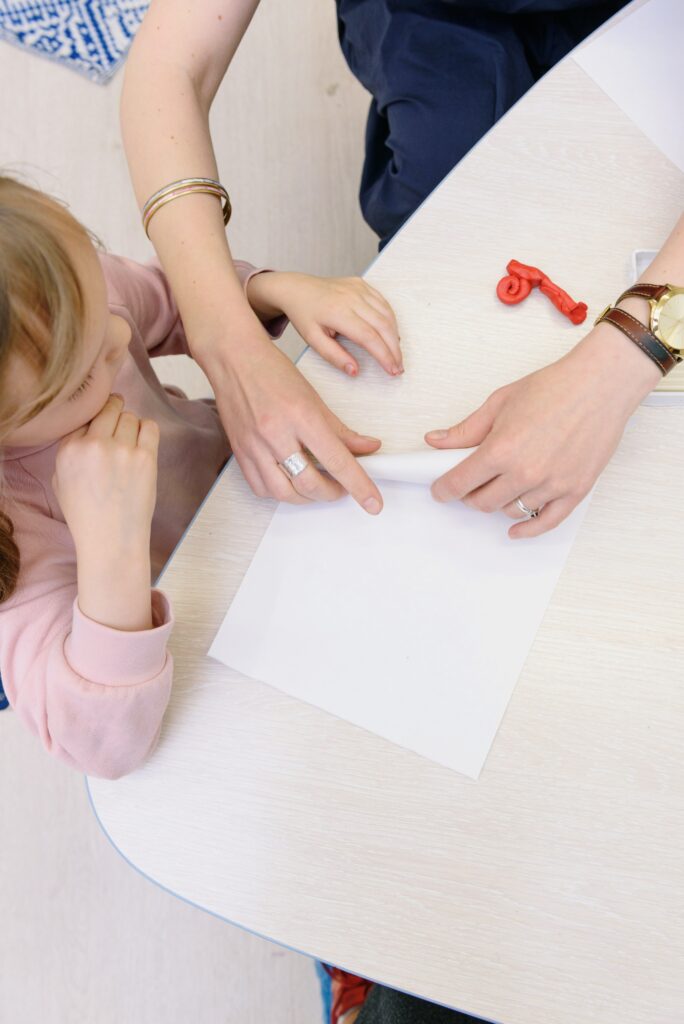If you’re a parent or guardian, talking about birds and bees with your children is inevitable. But not anymore! With the help of this blog, start talking today. No matter how confident you are, most parents dread the day when they have to talk about birds and bees with their kids. It can be a difficult conversation to have, but it is an important one. So, what is the birds and the bees? It is the metaphor term used for talking about sex.
Simply put, it is the act of reproduction. When talking to kids about sex, you don’t have to go into graphic detail, but you do need to explain the basics. The birds and the bees refer to a male and female coming together to create offspring.
And, if you are still not sure how to start this conversation with your kids, it’s okay! We are here to help.

Remember…
when it comes to talking about the birds and bees (sex) to kids, there is no one-size-fits-all approach. The important thing is to be open, welcoming, honest, and age-appropriate in your discussion.
You may want to start by talking about where babies come from in general terms, then get into more specific details as your child gets older.
Here are some tips that will help make this process a little bit easier for you.
Table of Contents
1. Start Early
If you want your kids to be well-informed about the birds and the bees (sex), it’s important to start talking about it early.
Research shows that children as young as three can start to understand basic concepts about human reproduction. Of course, you don’t need to give them a detailed biology lesson at this age. But it’s always good to start little, start early!
If you wait until your child is a teenager, they may already have formed some misconceptions about sex that will be difficult to change.
Additionally, teenagers are more likely to engage in risky sexual behavior if they don’t have a good understanding of human sexuality. By talking about the birds and the bees early on, you can help your child develop a healthy and safe attitude towards sex.
2. Make It Age-Appropriate
Your approach to talking about sex should be age-appropriate. Preschoolers, for example, will not need as much detail as teenagers.
The American Academy of Pediatrics recommends that parents talk to kids about the basics of human reproduction as early as age four. You can give them a little more information as they get older, but it is important to keep things simple and age-appropriate.
Also, be aware of your child’s maturity level. If they are asking questions about sex that you feel they are not ready to hear, it is okay to tell them that you will answer their questions when they are a bit older.
Remember, you can always provide more information as your child gets older. But make sure that they are developmentally ready.

3. Use Proper Terminology
Don’t make it complex and don’t feel embarrassed (it’s a mistake!). Use the proper terminology when talking with kids about birds and bees (sex). This will help your child understand what you are talking about, and it will also help them develop a healthy vocabulary when it comes to sex.
You don’t need to use clinical terms, but you should avoid using euphemisms or slang terms. These can be confusing and misleading for children.
We recommend using gender-neutral language when talking about sex. For example, you can say “people” instead of “boys and girls.” This will help your child understand that sex is not just for people who are of a certain gender.
Make sure your child understands their own body.

4. Be Open and Honest
Open your heart to them when talking about birds and bees.
Because, if you folks are not open and forthcoming about sex, they will likely seek information from other sources. (And you know those sources, right?)
This can lead to them getting inaccurate or inappropriate information. So, it’s always better to be open with your kids about sex than to have them get their information from unreliable sources.
5. Answer Any Questions They Have
If your kids are asking millions of questions about sex, it means that they are interested in the topic and that they want to learn more.
However, it can be a tricky topic to navigate, but if you approach it with honesty and clarity, you’ll be able to handle it like a pro.
You don’t need to give them all the details – just enough to answer their question. Keep it short, to the point, and complete.
Make sure your answers don’t leave them high and dry with incomplete and overwhelming details.
6. Be Prepared for Awkward Questions
Your child may ask you some awkward questions about sex. This is perfectly normal, and it’s a good thing! It means that they are comfortable talking to you about sex and that they trust you enough to ask questions.
Be prepared for some awkward questions and be sure to answer them honestly and straightforwardly.
Note: If you need more help, try talking to fellow parents (they might help and share some fun stories about the first talk with their kids on birds and bees!)
7. Teach Kids About Contraception and Safe Sex
Teach your children about contraception and safe sex. And help them protect themselves from STDs and unwanted pregnancies.
Again, you don’t need to teach them everything at once, but you should gradually introduce them to the topic of contraception and safe sex.
If you are not sure about how to talk to your kids about contraception and safe sex, consult your pediatrician or a trusted sex educator.

8. Encourage Them to Come to You With Any Questions Or Concerns
Encourage your children to come to you with any questions or concerns they have about sex. This is an important way to build trust between you and your child.
It’s also a good way to ensure that they get accurate information about sex and that they know they can come to you whenever needed.
Yes, boundaries are important but let’s not make this topic hard to discuss – it’s a part of life. Thousands of guides, blogs, and videos are available on the internet to help parents.
9. Keep the Lines of Communication Open
If your kid fears talking to you, we might have a problem!
It’s sad that in some households, talking about birds and bees (sex) to kids is non-existent.
Oftentimes, small little girls don’t have any idea about periods and if they get it, they become afraid thinking it’s some sort of disease and their parents might create chaos. This is one of the many problems with the lack of sex education in schools.
Parents should really take it upon themselves to educate their children about these things, so they won’t be left in the dark and be uneducated about their bodies. It’s important for young girls to know that periods are a normal and natural thing that happens to them so they can be prepared when it does happen.
The same goes for little boys. If they don’t have a proper idea about erections, for example, they may become scared or confused when they experience one. By talking about the birds and bees, boys can learn about the changes their bodies will go through during puberty and what to expect.
Parents Are Getting Better at Parenting by Talking – By Creating an Influence
There you have it – nine tips for talking about birds and bees to your kids. Follow these tips, and you’ll be able to talk to your kids about sex in a way that is easy and honest.
Don’t forget to keep the lines of communication open and be legit. Your kids will eventually know everything at the end of the day but it’s always better that it comes from you.
It’s you they need to hear EVERYTHING from. Not the other way around.
Yes, sex education at school works but let’s face it, talking about these things at school is a little too late. We should start talking about birds and bees when our children are much younger, like in kindergarten. That’s when they are starting to become curious about their bodies and the world around them.
As parents, it is our responsibility to educate our children about sex. And the earlier, the better.
Found this blog helpful? Help us now by sharing it with every new and old parent out there.
1 share = 1 good step towards parenting
About Me
Hi, there. I am Lin. Together with my husband and two kids, we live in the beautiful Netherlands in Europe. I am dedicated to self-development, creating quality time for the whole family, and fully supporting kids with their potentials and possibilities with all I have learned from engineering, MBA, and 10+ years of working experience in the energy sector.


